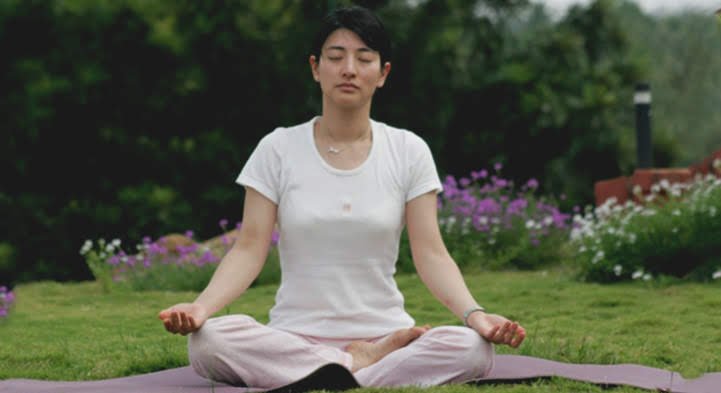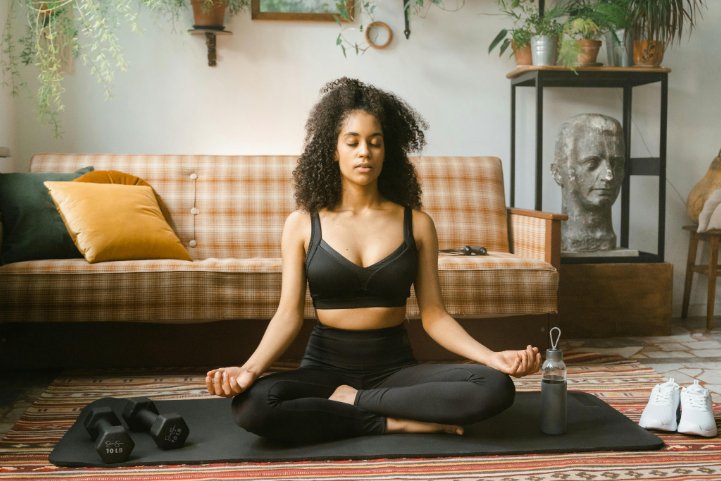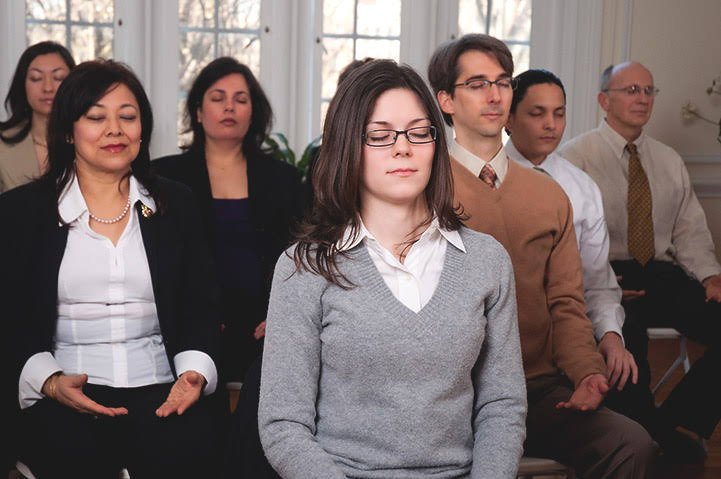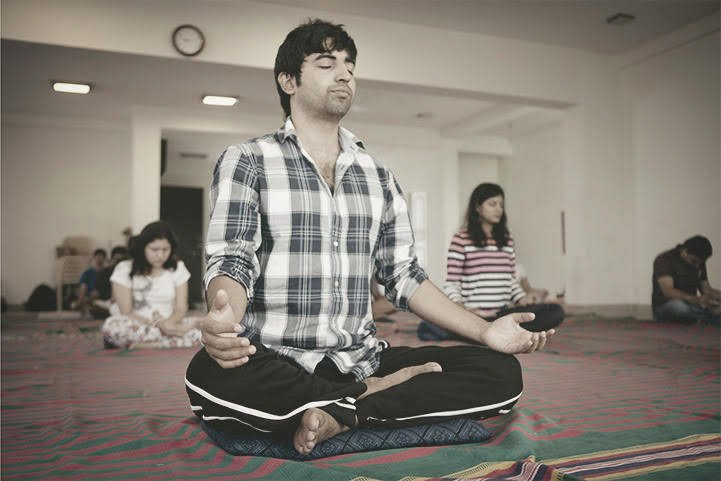
Benefits
Discover how daily meditation can enhance your mental clarity, reduce stress, and boost physical health. Start your journey to a healthier you today!
Meditation’s benefits go way beyond simple relaxation and offer a powerful tool to boost our overall wellbeing. Research shows that regular meditation can reduce stress and anxiety by a lot through decreased cortisol levels and heart rate. My experience with countless people’s transformations through mindfulness practices proves that even a few minutes of daily meditation can restore calm and inner peace.
Regular meditation practice boosts sleep quality, lowers blood pressure, and sharpens mental clarity. At Art of Living, we’ve seen how people who meditate consistently manage their everyday stress better. They also find relief from specific health conditions like irritable bowel syndrome (IBS) and post-traumatic stress disorder (PTSD). Meditation helps control job-related anxiety and reduces physical pain, which makes it versatile for modern life challenges.
In this complete guide, you’ll learn about the mental, physical, and spiritual benefits of daily meditation. You’ll also discover practical ways to add this life-changing practice to your routine—no matter how busy you are.

Daily meditation does more than quiet your mind—it reshapes your brain in amazing ways. The benefits of regular practice extend far beyond the temporary relaxation and create lasting positive changes in your brain’s function.
The science behind meditation’s effects on stress is clear. Your brain physically changes its response to stressors with regular meditation. Research shows that just 8 weeks of brief daily practice decreases negative moods and reduces anxiety scores. This happens because meditation triggers the brain’s “relaxation response,” which counters the fight-or-flight stress reaction that often rules our days.
Your brain responds to meditation by decreasing cortisol (the primary stress hormone) and lowering heart rate. These physical changes help break the links between brain regions that control stress reactions. You’ll learn to observe anxious thoughts without getting trapped by them.
The evidence looks especially promising for people with anxiety disorders. Mindfulness meditation helps reduce symptoms in people with generalized anxiety disorder, panic disorder, and panic disorder with agoraphobia. A quick 10-minute session can disrupt the cycle of worried thoughts common in anxiety.
Our world is full of distractions, so knowing how to maintain attention becomes more valuable each day. Meditation works like a mental gym for your attention span—building both strength and stamina. Regular practice helps you ignore negative sensations that could derail your concentration.
Research reveals that experienced meditators show better stability in brain areas responsible for mind-wandering. This stability links directly to better test performance, which suggests improved mental focus. Even beginners showed better executive attention after just 10 minutes of guided mindfulness instruction.
These changes mean better memory, mental clarity, and the ability to stay present instead of getting lost in distracting thoughts, which happens about 47% of the time for most people.
Meditation excels at building emotional resilience—your ability to bounce back from adversity and stress. Regular practice helps you manage emotions more effectively.
A review of 21 studies shows that mindfulness meditation substantially reduced stress and anxiety while helping people regulate emotions better. The brain changes from meditation create immediate improvements in resilience that grow stronger over time.
One interesting finding shows that meditation’s improvements in emotional control have a stronger connection to better moods than to improved thinking. This explains why people who meditate often feel more emotionally balanced, even during tough times.
Meditation provides valuable support for specific mental health conditions. Studies show it helps with:
Mindfulness-Based Cognitive Therapy (MBCT) can substantially reduce relapse rates in people who’ve had previous episodes of major depression. At Art of Living, countless individuals have found relief from ongoing mental health challenges through consistent practice.
You don’t need hours each day to meditate—even short sessions create meaningful changes. Consistency matters most, letting these mental benefits grow stronger as time passes.

Daily meditation doesn’t just calm your mind – it makes fundamental changes in your physical health. Our team at Art of Living has seen how regular practice leads to clear physical benefits that add to the mental advantages we talked about earlier.
High blood pressure puts millions at risk for heart disease, heart attacks, and strokes. Meditation gives people a natural way to manage heart conditions.
Research shows meditation techniques can lower blood pressure on their own or work with regular medications. A quality study showed participants’ blood pressure dropped by 4.3 mm (systolic) and 3.11 mm (diastolic) after three months of practice.
Elderly people with hard-to-treat systolic hypertension got great results from relaxation response training. Many controlled their blood pressure so well that they could cut back or stop their medications. This happens because meditation makes blood vessels wider and reduces inflammation.
The benefits get better with regular practice. The European Society of Hypertension now recommends daily stress-reduction methods like meditation to manage blood pressure.
Trouble falling or staying asleep? Meditation might help. A JAMA Internal Medicine study found people who practiced mindfulness meditation had less insomnia, felt less tired, and experienced less depression than those who only learned about sleep habits.
Your body gets ready for better sleep through meditation as your breathing slows down and your heart rate drops. It helps break the cycle of racing thoughts that keep you awake.
Studies show mindfulness meditation made sleep better right away and months later compared to other treatments. This worked for people of all types who had sleep problems.
Scientists made a fantastic discovery about meditation and immunity. University of Florida researchers found that just eight days of deep meditation kicks the immune system into high gear.
The first detailed genetic study on meditation’s biological effects showed increased activity in 220 immune-related genes. This included 68 genes linked to interferon signaling – crucial for fighting viruses and cancer.
These findings matter because:
- Meditation turned on 97% of interferon-response genes, while mild COVID-19 cases showed 76% activation and severe cases only 31%
- The immune boost came from meditation alone, not from changes in diet, sleep, or gender
- The benefits lasted three months after people stopped meditating
A researcher put it simply: “Nobody has shown before that meditation can boost interferon signaling. This shows we can improve our immune system without medicine”.
Chronic pain hits you physically and emotionally. Meditation helps manage pain by changing how your brain processes pain signals.
While it won’t eliminate pain completely, meditation can change your relationship with it. Research shows mindfulness methods reduced pain intensity in 62.5% of cases.
The results last too. Massage therapy helped right away but wore off, while mindfulness created improvements that stayed even after 12 weeks.
People with fibromyalgia and arthritis find relief through meditation. It helps them relax and sleep better. They can do more activities because they handle pain better and worry less about making it worse.
At Art of Living, we combine meditation with yoga and breathing exercises to tackle both physical pain and emotional stress. Our wellness retreats give people natural tools to better manage their pain.

Learning about our inner world through meditation creates new paths to emotional and spiritual growth. My time at Art of Living has shown me how regular practice changes not just our minds and bodies, but also how we connect with ourselves and others.
Meditation naturally develops deeper self-awareness. Practitioners learn to recognize thought patterns and emotional responses without judgment. Regular meditation helps us watch our thoughts and step back from them. We understand these thoughts don’t define who we are. This broader awareness stays with us beyond meditation sessions.
Studies link long-term meditation to positive self-attitudes like non-attachment, self-compassion, and equanimity. We become more in tune with our internal experiences and build a kinder relationship with ourselves. This emotional understanding helps us handle life’s challenges with grace.
Research shows meditation gradually alters how we process self-related information. Practitioners stop seeing themselves as fixed personalities. They begin to experience life as an evolving process—a radical shift in their point of view.
Meditation gives us the precious gift of inner peace. The practice clears away the daily information overload that builds up stress. This mental clearing creates room for real tranquility.
The peace we find extends beyond our meditation sessions. A researcher notes, “Meditation can help take you more calmly through your day more calmly”. Regular practice teaches us to find stillness even when life gets chaotic.
Compassion meditation focuses on developing kindness toward ourselves and others. Studies show it activates brain regions tied to empathy. Long-time meditators show stronger activation in the insula—an area that detects emotions—when they generate compassion.
Research proves that compassion meditation reduces anger and anxiety in social situations. It increases helpful behavior and empathy. These practices build connections by highlighting our shared human experiences.
A pilot study of compassion meditation training revealed clear drops in depression, shame, anxiety, and self-criticism. The Dalai Lama’s words ring true: “Compassion and tolerance are not signs of weakness, but signs of strength”.
Meditation has always been a path to spiritual awakening. “Buddha” means “one who is awake,” which points to meditation’s core purpose. Many people find that regular meditation connects them more deeply with their higher self or true nature.
Steady practice leads to new ways of seeing—moments where we experience ourselves and others differently. In quiet moments, people often find what one practitioner calls “a peace that passes all understanding”.
At Art of Living, we see meditation become more than just a daily practice. It turns into a life-changing trip toward self-discovery and spiritual growth.

Adding meditation to your daily schedule changes more than quiet moments—it reshapes how you live each day. My years of work with meditation practitioners have shown that regular practice becomes the lifeblood habit that shapes many parts of life.
Making meditation a daily practice brings profound benefits beyond quiet moments. A short but regular practice matters more than length—even 1-5 minutes each day works better than random longer sessions. The early morning works best because our minds stay calmer than in the later hours.
Most people discover that after the first few weeks, meditation becomes a welcome part of their day. A meditation teacher puts it well: “Regular practice makes you look forward to meditation as something that makes you feel better in body, mind, and emotions”.
The routine itself matters—taking time to meditate shows “your wellness matters”. This small daily commitment often guides people to stretch their practice from one minute to 5, 10, or 15 minutes as they see more benefits.
Meditation’s practical power lies in making better decisions. Research shows that it helps people stay present while releasing past regrets and future worries. This mental clarity changes our approach to choices.
Wharton Business School studies show meditation’s good effects on both shopping choices and business decisions. Short meditation breaks throughout the day can help you think more clearly.
Meditation changes how we handle impatience. The experience follows a pattern: you notice impatience more clearly, then resist it less, and patience grows naturally. Instead of forcing patience, meditation helps us let go of impatience—a small but significant difference.
In stark comparison to this common belief, meditation boosts productivity significantly. Regular practice helps your brain focus better—the true source of getting things done. One guided session can improve focus and cut mind-wandering by 22%.
“Open-monitoring” meditation works best for creativity. This style helps you think more freely and come up with new ideas. It makes your thinking more flexible and less rigid. Studies prove that regular practice improves memory, makes thinking more flexible, and helps process information faster.
Big companies like Google, Shell Oil, and General Mills use meditation at work for these exact benefits. My personal experience shows that after meditation, creative ideas flow better, I hear my colleagues more clearly, and combine different ideas more easily.

You don’t need complex techniques or expensive equipment to begin your meditation trip. The key to this life-changing habit is consistency, not the duration of your meditation.
A dedicated meditation area makes your practice more sustainable. Pick a peaceful corner in your home that you naturally pass each day. The size doesn’t matter – even a small, cozy space works great. What matters is creating an environment that helps you practice.
Add elements that make you feel peaceful: comfortable cushions, plants, natural light, or maybe some essential oils. A clutter-free space creates a calming atmosphere that makes you want to come back every day.
New meditators find success with just 3-5 minutes. This builds confidence early and helps you think “meditation is easy for me” instead of “I struggle with meditation”. You can increase your time once you’ve made it a habit.
Morning meditation works best because daily distractions haven’t started yet. Link your practice to something you already do—like brushing teeth or having coffee—to blend meditation into your daily routine.
Meditation apps are a great way to get structured guidance. Headspace offers a user-friendly platform with hundreds of guided sessions. Calm works well for advanced meditators who want flexible timers. Insight Timer gives you access to over 150,000 free meditations. Sattva, the number one free global app for meditators, includes guided meditations, chants, mantras, a meditation timer, and a tracker.
UCLA’s Mindful Awareness Research Center has free downloadable guided meditations and podcasts.
Community support makes it easier to stay consistent. Groups like Shambhala offer free guided sessions designed for beginners. Meetup connects practitioners through 4,735 groups worldwide. The Art of Living also offers group practices in-person and online.
Tracking helps turn meditation from something you do occasionally into a habit. Apps with progress features show your growth, while meditation journals help you capture insights and emotional changes.
Note that meditation is a lifelong skill, not a quick fix. Regular short sessions are more valuable than one long session.

Q1. How long should I meditate each day to see benefits? Even short sessions of 5-10 minutes daily can yield significant benefits. Consistency is more important than duration, so start small and gradually increase your practice time as you become more comfortable.
Q2. Can meditation help with specific health conditions? Yes, research shows that regular meditation can help manage various health issues, including high blood pressure, chronic pain, anxiety disorders, and sleep problems. It’s also been found to boost immune function and support mental health conditions like depression and PTSD.
Q3. Will meditation make me more productive at work? Many practitioners report increased productivity and creativity after establishing a regular meditation practice. It can improve focus, enhance decision-making skills, and reduce mind-wandering, all of which contribute to better work performance.
Q4. How does meditation affect emotional well-being? Daily meditation can significantly improve emotional resilience and self-awareness. It helps cultivate inner peace, increases compassion and empathy, and provides tools for better emotional regulation, leading to more balanced responses to life’s challenges.
Q5. What’s the best way to start a meditation practice? Begin by choosing a quiet space and time, ideally in the morning. Start with just 5 minutes daily, using guided meditations or apps if helpful. Consistency is key, so try to meditate at the same time each day. Consider joining a meditation group or course for additional support and guidance.

Daily meditation changes lives way beyond what most people expect. This piece explores how a simple practice reshapes our mind and body while it nurtures our spiritual essence. A few minutes each day brings excellent results – from less stress and anxiety to better focus, emotional balance, and physical health.
Research backing meditation’s benefits keeps getting stronger. Medical studies confirm what people have known for centuries – meditation brings down blood pressure, boosts immune function, helps you sleep better, and eases chronic pain. The emotional and spiritual benefits create ripples through life and promote greater self-awareness, compassion, and inner peace.
Meditation stands out because it’s accessible to anyone. You don’t need fancy equipment, extreme flexibility, or lots of free time. Regular practice matters more than how long you meditate. Five minutes daily creates a better transformation than random, longer sessions.
We’ve seen countless people change their lives through regular meditation at the Art of Living. These changes stick and build up over time. The calm centeredness you develop during meditation flows into your daily activities. This improves your decisions, boosts creativity, and creates deeper connections with others.
Now is the perfect time to start your meditation trip if you haven’t already. Take small steps, be patient, and note that meditation is a skill that grows with practice. What starts as a daily choice becomes part of your routine – something you look forward to rather than calling it a task.
Meditation gives you something precious in our busy world: a chance to know yourself better and live life fully. This daily practice creates space between what happens and how you react. It helps you guide through life’s challenges with wisdom and grace. Start meditating today and find out how these quiet moments can change your whole life.

Knowing the benefits of meditation is one thing—experiencing them every day is another. The Art of Living Part 1 Course teaches SKY Breath Meditation, a simple, science-backed practice that helps you feel calmer, sleep better, think clearer, and enjoy life more—starting from your very first session.
With expert guidance and tools you can use anywhere, you’ll build a practice that’s easy to keep and hard to live without.
🌿 Make daily meditation a joy, not a chore.
👉 Join the course and start reaping the benefits of a calmer, more focused, and more energized you.












